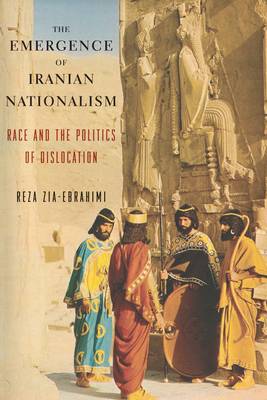
Stock image for illustration purposes only - book cover, edition or condition may vary.
The Emergence of Iranian Nationalism: Race and the Politics of Dislocation
Reza Zia-Ebrahimi
€ 77.02
FREE Delivery in Ireland
Description for The Emergence of Iranian Nationalism: Race and the Politics of Dislocation
Hardback. Num Pages: 320 pages. BIC Classification: 1FBN; JPFN. Category: (P) Professional & Vocational. Dimension: 229 x 152. Weight in Grams: 454.
Reza Zia-Ebrahimi revisits the work of Fath?ali Akhundzadeh and Mirza Aqa Khan Kermani, two Qajar-era intellectuals who founded modern Iranian nationalism. In their efforts to make sense of a difficult historical situation, these thinkers advanced an appealing ideology Zia-Ebrahimi calls dislocative nationalism, in which pre-Islamic Iran is cast as a golden age, Islam is reinterpreted as an alien religion, and Arabs become implacable others. Dislodging Iran from its empirical reality and tying it to Europe and the Aryan race, this ideology remains the most politically potent form of identity in Iran. Akhundzadeh and Kermani's nationalist reading of Iranian history has been drilled into the minds of Iranians since its adoption by the Pahlavi state in the early twentieth century. Spread through mass schooling, historical narratives, and official statements of support, their ideological perspective has come to define Iranian culture and domestic and foreign policy. Zia-Ebrahimi follows the development of dislocative nationalism through a range of cultural and historical materials, and he captures its incorporation of European ideas about Iranian history, the Aryan race, and a primordial nation. His work emphasizes the agency of Iranian intellectuals in translating European ideas for Iranian audiences, impressing Western conceptions of race onto Iranian identity.
Product Details
Publisher
Columbia University Press
Format
Hardback
Publication date
2016
Condition
New
Weight
616g
Number of Pages
312
Place of Publication
New York, United States
ISBN
9780231175760
SKU
V9780231175760
Shipping Time
Usually ships in 15 to 20 working days
Ref
99-15
About Reza Zia-Ebrahimi
Reza Zia-Ebrahimi is lecturer (assistant professor) in history at King's College London.
Reviews for The Emergence of Iranian Nationalism: Race and the Politics of Dislocation
The Emergence of Iranian Nationalism breaks new ground in the study of recent Iranian history. It reveals and analyzes the dirty little secret of Iranian nationalism, namely that it contains a racist dimension. It is not only a well-researched and well-written book, it is also a courageous book.
Houchang Chehabi, Boston University The Emergence of Iranian Nationalism is a major contribution to the intellectual history of modern Iran. Reza Zia-Ebrahimi has brought into critical focus some of the most pious and intractable certainties that have long defined the ideology of Iranian nationalism. Both erudite and iconoclastic, this book is sure to stir much contentious debate.
Afshin Marashi, author of Nationalizing Iran: Culture, Power, and the State, 1870-1940 Zia-Ebrahimi persuasively argues that the texts of a few writers furnished the basis of a nationalist ideology asserting the Aryan essence of an ancient nation, an ideology taken up by Iran's Pahlavi rulers and still significant. His book is a substantial contribution to modern Iranian history and has relevance beyond the field of Iranian studies. Zia-Ebrahimi's argument is related to key debates in the field of nationalism studies and his methods can be illuminatingly applied to other cases.
John Breuilly, London School of Economics The Emergence of Iranian Nationalism brings to final and definitive fruition a body of critical thinking about the origin and rise of Iranian nationalism deeply rooted in the Eurocentric racism of the nineteenth century. Zia-Ebrahimi lasers in on the crucial instantiations of this powerful ethnocentric construction of the nation, carefully dissecting and critically dismantling them. This is a must read and an exemplary piece of scholarship declaring the rise of a new generation of scholars who are overriding the cliches and hang-ups of their parental generation.
Hamid Dabashi, Columbia University An important work and should be read by anyone interested in modern Iranian studies... Highly recommended. Choice This vital and meticulously researched book will serve as a challenge to scholars in Iranian studies and to Iranian intellectuals in general to more meaningfully engage with transnational critical race theories. International Journal of Middle East Studies
Houchang Chehabi, Boston University The Emergence of Iranian Nationalism is a major contribution to the intellectual history of modern Iran. Reza Zia-Ebrahimi has brought into critical focus some of the most pious and intractable certainties that have long defined the ideology of Iranian nationalism. Both erudite and iconoclastic, this book is sure to stir much contentious debate.
Afshin Marashi, author of Nationalizing Iran: Culture, Power, and the State, 1870-1940 Zia-Ebrahimi persuasively argues that the texts of a few writers furnished the basis of a nationalist ideology asserting the Aryan essence of an ancient nation, an ideology taken up by Iran's Pahlavi rulers and still significant. His book is a substantial contribution to modern Iranian history and has relevance beyond the field of Iranian studies. Zia-Ebrahimi's argument is related to key debates in the field of nationalism studies and his methods can be illuminatingly applied to other cases.
John Breuilly, London School of Economics The Emergence of Iranian Nationalism brings to final and definitive fruition a body of critical thinking about the origin and rise of Iranian nationalism deeply rooted in the Eurocentric racism of the nineteenth century. Zia-Ebrahimi lasers in on the crucial instantiations of this powerful ethnocentric construction of the nation, carefully dissecting and critically dismantling them. This is a must read and an exemplary piece of scholarship declaring the rise of a new generation of scholars who are overriding the cliches and hang-ups of their parental generation.
Hamid Dabashi, Columbia University An important work and should be read by anyone interested in modern Iranian studies... Highly recommended. Choice This vital and meticulously researched book will serve as a challenge to scholars in Iranian studies and to Iranian intellectuals in general to more meaningfully engage with transnational critical race theories. International Journal of Middle East Studies
